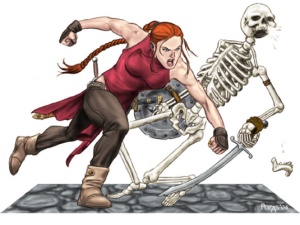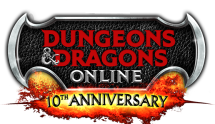
These guys know how to role-play in AD&L (Advanced Dungeons & Lawyers).
Watch out for that OBJECTION! intimidate move!
Credit: Tegehel
Yep, I’m going to keep going with comparisons to DDO with the light novel/anime show, Log Horizon. The show depicts RPG teamwork so well that it should be required viewing/reading by all players.
With several of my characters redefined a bit based on the show’s “Assassin” and “Guardian” (more on the Assassin in another post), I’m reviewing who might best fit the role of the “Enchanter,” a class that provides critical party support to augment ally attacks or degenerate enemy defenses.
What’s harder here is that the Enchanter to emulate is Shiroe, the main character of the show. As he describes himself, Enchanters have weak attacks so they are best a party support character. But Shiroe’s successes come less from what spells he knows but in how he uses them and how he works with teammates.
Shiroe is well-known for his mind–specifically, he’s a terrific strategist. He’s so good that he (together with others from his old static group, who played so well that they beat high-end raids) is nicknamed as “Villain in Glasses.” As his friends and enemies learn, his strategy skills work both on and off the battlefield.
Let’s stick to combat, so as not to spoil your future viewing. Shiroe’s allies talk about his battle strategy they call “full encounter control.”
When some of us decide to play in a pick-up group, the worst case scenario is that you’ll find yourself, as party leader, trying to gain control with the inexperienced and impatient members of your party. All the while, the dungeon’s enemies are attacking.
Even with a group of guildmates, chaos may not be far away.
The reason that some quests go off the rails is not due to the quest itself. Most DDO quests are quite predictable. It’s the players involved, of course.
I submit for your consideration a few basics of battle combat I’ve picked up from Shiroe.
Get Acquainted
Shiroe has an apprentice, a girl named Minori, who plays a Shrine Priest, a healing class that also has player-support abilities. Realizing her inexperience, she makes a notebook of Shiroe’s strategies and tips.
When she herself is in a party, training to fight in a dungeon, everything goes wrong. Aggro moves from the tanker to the spell casters. No one’s hardly aware of what their enemies can do. The little party is woefully beaten, time and again.
Most importantly, none of the party is aware of what others in their own party can do.
Before the young party leaves for the dungeon to have their ass handed back to them once more, Minori forces them to sit down and learn party mechanics, defense grouping, and what spells or attacks each party member can do and how it can benefit in tanking, aggro, and offensive strategies.
After a day of learning and appreciating who can do what, the little party goes back into that dungeon and curb-stomps it effortlessly.
I know I have many regular readers (thank you!) so I’m sure you’ve gained a greater appreciation of the Monk class. But how knowledgeable are you about the Wizards? Artificer? Bard? I know enough from Artificer and Bard but I’m hardly an expert.
If we don’t know what spells, attacks and defenses are possible by every class, how would a party ever achieve its true potential?
Know Your Role
Minori not only taught her party in conversation what each class can wield, but why they wield it and when they should do so.
In DDO, the dynamics of “create a character and play” lacks a central element of Dungeons & Dragons, the tabletop game. In D&D, you roll up a character that conforms not only with a specific rule set (the world, environment and class rules) but a class itself, which has a specific purpose, ultimately, as part of a team.
In DDO, once you make your character, you’re often shoved into the game, alone. Perhaps you’ll find some friendly folk and become part of a guild. Or you’ll join a PuG and become hooked with good players or ultimately discouraged and never try again.
DDO doesn’t help keep the D&D teamwork concept needed to join others to have a chance at understanding your character and how it fits in the world.
DDO players often eschew roles because it gets in the way of combat. Maybe I should say that roles get in the way of players creating super-powerful adventurers using complex multiclassed builds.
Some players have no problems trying to super-glue trapfinding, combat and casting skills in one character. We’re likely not to see such a character in a party but only mentioned as a thread in the Achievements forum after soloing a raid. While soloing certain things for fun on occasion isn’t inherently a bad thing (I just did that myself with “The Shroud”), should solo running be the norm in DDO?
I say, nay, nay!
Many DDO quests do support (and sometimes require) a well-rounded party. “The Vault of Night” pre-raid is one shining example. Surely, every quest should be easily conquered with such a group.
Roles don’t mean you have to pigeonhole your character. Rogues don’t always have to only take down traps, but they should be trained to make a better effort than a Ranger. Monks won’t always stun, but they should be able to keep weaker party members protected by removing dangerous bosses. Wizards and Sorcerers, Bards and Artificers also can adjust a few things for flavor.
But in the end, a class exists to do something and do that something very, very well.
No class is better at trapfinding and disarming them safely than a Rogue.
No class can keep aggro better than a Fighter or Paladin.
In the LH example, the team’s first organized fight sent in their Samurai, a tanking class, to fight and generate sufficient aggro so that other party members were able to heal and support him. Once aggro was firmly in place, their sorcerer delivered the killing blow.
Is there something wrong in your party when your healer is leading your group into battle? Of course.
Trust Your Party…and its Leader
Shiroe and Minori were effective because they instilled trust between party members. Each leader coordinated their party to deliver the maximum effectiveness, even when that team comprised only three people.
The best guilds work because players have learned how a class works but also how a player works. Further, other players know of their leader’s abilities. This is especially true when a party enters an unknown area or encounters a superior force.
You can have good parties but poor leaders. As a result, you’ll likely lose the one element that Shiroe does all the time, battlefield or off the field. He thinks ahead. Way ahead. He anticipates how much HP and mana will be remaining for allies and enemies at a certain time. He’s calculating enemy attacks and movement. Shiroe’s friends believed that he was able to see about 30 seconds ahead in any battle. Minori emulated enough of Shiroe’s ability to see maybe 5 to 10 seconds ahead.
But seeing ahead in a DDO fight is far easier. Resources such as DDO Wiki already tell you what to expect. The challenge is first interpreting that data into the reality of the quest itself, and then having your party readied to meet that reality.
Communicating these elements requires someone to whom the party will listen. Some victories help here. Recovering from unexpected situations, more so.
How many parties have you joined where no one’s listening to the party leader? How many of these quests failed?
Leaders should know a quest inside and out.
But for DDO, a party leader needs to have some dungeon-master skills to help a team maximize not only their potential but also their fun in exploiting their roles to the fullest.
Sure, you could direct your party to scream and leap into a horde of orcs. Or you can have your Rogue lay a web trap or two, lure then into it and let your casters cremate the bunch while your fighters sharpen their weapons for later.
Creative leadership adds to the fun and reduces the repetitiveness of quests that will often give you the same objectives over and over. The trick is leading your team to conquer in another way or with greater stakes. Perma-death, stealth, naked, or with specific weapons. Pick your challenge.
This Is Our Reality
DDO isn’t “Elder Tale,” the fictitious RPG fantasy game in Log Horizon. But these fictitious characters, even the evil ones, play a better game of D&D than we do sometimes.
I’m sure, however, your best memories of the game come from the times where everything clicked, and not simply because you had enough DPS.
There is no “i” in “D&D” or “team.” Cliche, yes, but true.
Compare and contrast my post to an enlightening PDF excerpt from a D&D rule book where feats can aid in teamwork.



Sep 24, 2014 @ 12:10:53
Reblogged this on DDOCentral.
Sep 26, 2014 @ 09:09:58
Definitely some terrific insights!! I know that the vast majority of times when I fail, it purely because I was trying to take on more than I could handle or because the the group became too disorganized. Finding that mix can sometimes be hard to do, whether you solo or party up. This is also why I like to have characters in each class and each race, so that I can get an idea of their capabilities on my own :). But then again that leads to a lot of characters…
Sep 26, 2014 @ 09:23:20
That’s the fun and challenge. No one says that you only get to play one role. It’s just best, in my opinion, to exploit your class’s strengths, rather than glomming from others. So when a party needs a Rogue, get out your Rogue. Make as many characters to fit the need.
My not-so-subtle point is that many people who play DDO have little to no concept of RPG teamwork, and that their fun might be enhanced a bit if they did.